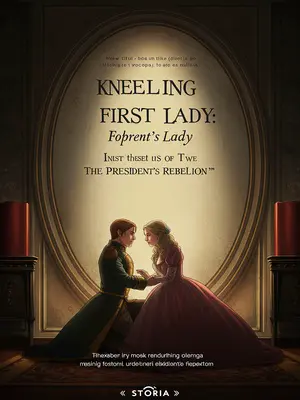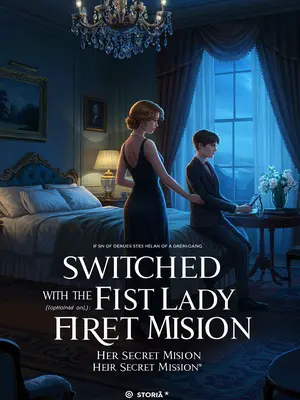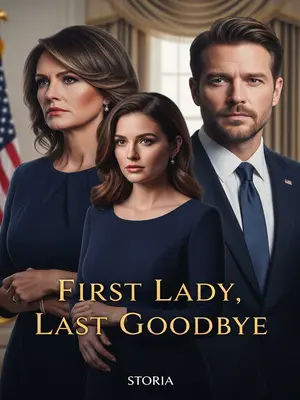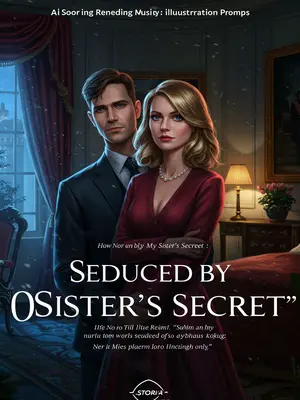Chapter 13: The Legend of Hayes the Great
I appeared moved, not sure if he believed it. After returning, he went to a cabinet meeting. I stayed in the First Lady’s suite.
Victoria, after he left, solemnly saluted. “Ma’am.”
I helped her up. “I haven’t seen Victoria in years—you’ve worked hard. I missed you.”
At this, Victoria’s eyes reddened. She took a handkerchief, gently wiped my hands. “Henry’s dirty.”
I looked at her, suddenly smiled. “Victoria is much livelier now.”
She froze, then smiled warmly. Before she could speak, Brooke came in, hugging us both. “Now we’re finally together.”
Victoria frowned, gently said, “Brooke, don’t be disrespectful to the President.”
Brooke joked, “Audrey will soon rule the country. As they say, rulers are lonely. We’re so sincere—Audrey must be happy.”
Victoria met my eyes, thoughtful, and nodded. I felt a chill, then heard her tell Brooke, “Your boyfriends—why not share one with Audrey?”
Such wolfish words from Victoria stunned me. Brooke’s eyes widened. Unable to bear the kindness, I quickly changed the subject.
Victoria asked when to act. I tapped the table—the sound and scent mingling. “Three days.” I always liked swift action.
On the wedding night, I looked at the burning red candle, recalled the dream—in bed, Henry was frightened by the scar on my back, lost interest. Now, though I avoided the nearly fatal scar, I still had many. I licked my teeth, unsure if he acted the same today. I might not resist slitting his throat.
While waiting, an aide nervously reported the President was delayed by the miscarriage of Lady Young, wouldn’t come tonight. I raised a brow, wondered whose doing this was—Henry wanting to slight me, or Victoria thinking Henry had no skill, wanting me comfortable the first time.
I thought it was fine, went to bed early. Unexpectedly, soon Victoria’s assistant knocked. I dressed and opened the door—the assistant brought a handsome man.
“Madam said, you shouldn’t be wronged.”
I held my forehead, unsure what to do. I solemnly said, “Tell Victoria, with war coming, I can’t get pregnant.”
Victoria’s assistant, as old-fashioned as her boss, pondered, found it reasonable, and left.
I closed the door, wondered how Brooke convinced Victoria. But I didn’t mind boy toys. As a woman President, the path was dangerous, full of obstacles from those accustomed to power. If the room is too dark, you need a window; if none agree, tear off the roof first, then make adjustments.
---
In the following days, Henry, whether by design or accident, was kept in other suites for various reasons. In the morning, I went to greet the First Lady, saw Lady Young from afar—heroic, smiling at me with respect. I smiled back, understanding.
Not all the women in the White House were Victoria’s people; some were simply curious or wary of me. I looked at their beautiful faces and sighed—such excellent women could teach at the women’s academy, which lacked talent.
Three days later, chaos erupted everywhere; the government was unstable, some officials fled with their families. Henry planned to move the capital to the Midwest, but first wanted to kill me, fearing my roots and for his reputation. When I heard the news, I found it ridiculous.
At this time, listening to the wind outside, gently wiping the Liberty Saber, sometimes the blade hummed, as if hearing the prairie wind. The suite was dim, burning imported candles; the couch covered with white mink, the cool touch soaked in perfume—a sense of decadent luxury.
Saber light flashed, as if a white line split the darkness. A group of Secret Service agents rushed in like rats, startled by the blade’s light. The lead agent yelped, knelt, the executive order crumpled on the floor.
“First... First Mistress,” the agent’s voice trembled, afraid the blade would stab his head, cursing the President for being unreliable, angering the First Mistress even now.
I laughed. Henry was less clever than the agents.
The agent performed his role, showing fear and hesitation. I used the saber to pick up the paper.
By executive order, the President decrees: First Mistress Hayes is jealous, confined to the East Wing, not to leave without summons.
Clearly, he was panicked, wrote hastily, didn’t dare strip my title. I really can’t imagine what presidential education is for.
The agent sneaked a glance, saw the woman’s splendid attire, eagle pin in her hair, lips curled, eyes cold. Idiot. The agent finally cursed the President.
“I understand, you may go.” I waved them away.
The agent didn’t expect it to end so easily, but couldn’t think more. Having done his duty, he had served the country. Once outside in the sun, he found his back soaked. But he had other things to do—had to get his hidden wealth and flee the city. He ordered, except for a few close colleagues, everyone to scatter, running in panic.
I watched the shadows scatter, feeling that people are like small beasts—seeking survival in chaos, always alert, but often unaware of the real threat, just fleeing blindly.
Behind me, footsteps sounded. I turned—Victoria’s assistant held a tray. I put my hand on it; the eagle on the pin vivid, gold thread shining in the candlelight—a beauty not of delicate flowers, but of power, dazzling.
Looking at the sky, leaden clouds rumbled—a storm coming. Then, in presidential regalia, I ascended the dais, as black-armored guards swept through, shocking all.
Soon, the government was a river of blood, my eyes red from fighting. Suddenly, Victoria stopped me, shaking her head. I came to my senses, stood up, and the officials bowed. I took Victoria’s hand; she steadily supported me to the Resolute Desk. The sunset sank; Victoria and I looked at each other and smiled.
The moment felt almost holy, the two of us standing in the dying light, the future wide open before us.
---
Pacifying the capital’s elite families was not easy. I dismissed the White House women—some refused to leave, standing in the sun, stunned by its glare. Brooke, arms folded, smiled brightly. “You don’t eat for free—do some work.”
Her Southern drawl was sharp as a whip, and the women—quick studies—soon found their place in the new order.
The women knew more than just etiquette. Most who survived the White House were very smart—from accounting to politics, they knew a bit. I had few confidants, so I used them—unexpectedly, I gained much. Later, in the Cabinet, they went from excited to calm, like portraits coming alive.
Brooke led troops to recover the West; I saw her off from a high tower—she saluted from afar, then left with the army. Soon, I would march Southwest.
At last, only Victoria and I were left on the balcony. We chatted briefly, but with many affairs, had to return to the White House. In the office, we buried ourselves in reports.
Victoria’s gentle voice sounded behind me. “Audrey, I always feel I can’t see you clearly. You’re too indifferent—a good President must balance severity and kindness to win the people’s hearts.”
Her words hung in the air, honest and unafraid. I listened, feeling the old walls inside me begin to crack.
I paused, hoarse, turned, saw Victoria reading at the desk, serious. Slowly, I straightened my face. “Victoria is right.”
The past replayed, dream or reality—a huge sense of fate and emptiness settled, like a pond clearing, reflecting the moon. My heart grew calm, felt reborn. Watching the world, my attitude changed; I no longer wanted just power, but the people’s welfare. I was happy, brows relaxed, as if ice melted and spring began. “With Victoria by my side, I am blessed.”
Victoria saw my brows relax, smiled in relief. The President seemed to change—her aura clear, reborn, sharp. She didn’t know what she said, but felt she had helped, and smiled gently at the praise.
Leaves fell outside, as if back to the days in the library, reading and laughing together. With Brooke’s support through Marcus Han, victory came soon. Now North, West, and Central were under my rule. I appointed Victoria as Chief of Staff, Brooke as Secretary of the Treasury, and set out to conquer.
A year and a half later, as the Iron-Blooded President, I unified the country—even made foreign alliances. Entering the Southwest Governor’s mansion, Carmen came out, knelt, and said, “That day, I was just gambling. Now, I am truly lucky.”
I pulled her up, laughter ringing through the hall. The era of women had arrived, and we were its architects.
---
My official husband is Prince Alejandro of a foreign land—innocent and without background, able to unite allies, greatly pleasing me. I am often irritable, feel flawed, but Victoria is always by my side. Victoria loves the people, never married, living as freely as Brooke once did. Brooke, surprisingly, settled down, met a gentle scholar, and was smitten.
The White House, once a cage, was now a home filled with laughter and the scent of fresh-cut flowers. My family—chosen, not born—stood with me.
Half my life spent in war and power, I have only one daughter—fortunately talented. Named Charlotte Hayes, proud and unrestrained. One day, she returned from D.C. with friends, riding heroically. Victoria told me, “I always say, having you is a blessing for the people, and for women, as seen in every detail.”
Charlotte’s laughter echoed down the halls, a promise that the world we built would not die with us.
Half the Cabinet always hoped for a son, only to be disappointed. There could be no son—even if one were born, only a daughter. Those who profited from the old world cannot adapt to change; they wish to undo my efforts, but that would take another lifetime.
On a pilgrimage, I climbed a tower and met a mad priest, thin as a skeleton. He laughed, cursing the last President—said he burned churches, but did he ever think of today? He raved until he died in tears. I wanted to ask about the dream, but kept it in my heart.
From his words, I learned the Third Son once met a sage who predicted my fate: "Eagle Crest," a word of destiny. He hid the truth, spread rumors I was a lone star, then acted as my only light. I remember he once gave me an eagle-crest cufflink. After returning, I smashed it, found ashes inside—a lucky charm. Ridiculous.
I understood his last words—he wanted me bound by the world, by love. But he didn’t know—being a woman doesn’t mean being trapped by love.
---
Hayes Administration, the first woman President, posthumously called Hayes the Great, Audrey Hayes. Founder of the Hayes Era—diligent and wise, recruited talent, governed well. Under her, literature flourished, people lived in peace, the economy was stable, culture prosperous, politics clean—known as the Golden Age of Hayes.
She set the precedent for women as Presidents, the first female leader in history, promoted women to office, and slightly eased male dominance after the patriarchal era. Her daughter Charlotte succeeded, called Hayes the Wise, and continued her mother’s policies. After Hayes the Great, Hayes the Wise, and Hayes the Just, male dominance was fully reversed.
Victoria Langley, last First Lady of the Callahan Administration, legitimate granddaughter of the First Lady, a wise Chief of Staff, often advised Hayes the Great, promoted civil governance, encouraged exams, left no heirs. After her death, the nation mourned, Hayes the Great personally attended her funeral as a friend. Her tomb, by Hayes the Great’s will, was moved to the presidential mausoleum. The story of President and Chief, passed down for ages, praised in history and poetry.
(The End)













